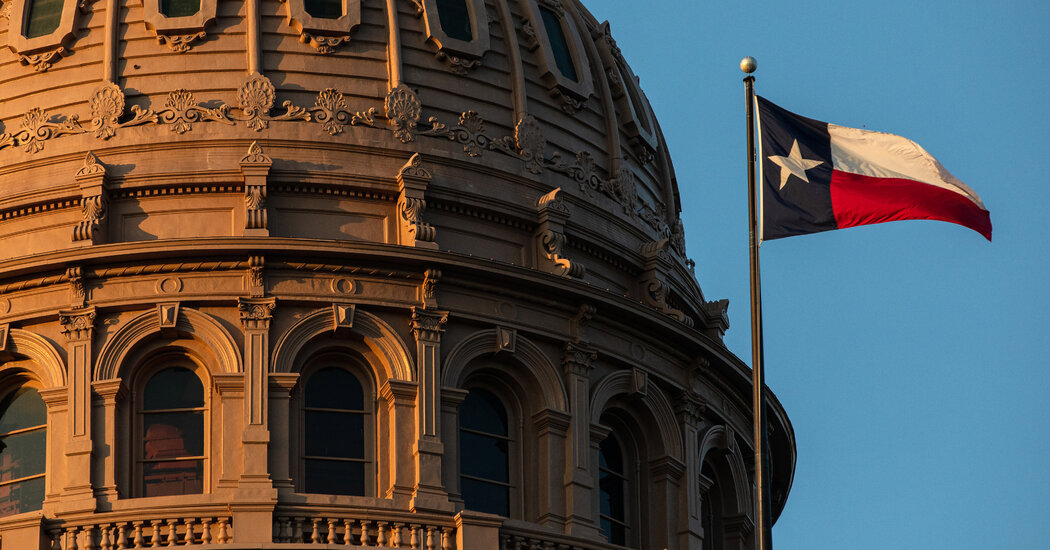
WASHINGTON — The Justice Department on Thursday sued Texas over the state’s new voting law, arguing that the Republican-led measure would disenfranchise Texans who do not speak English, people with disabilities, older voters and those who live outside the United States.
The department argues that the law violates the Voting Rights Act by limiting the help that poll workers can provide to voters. It also contends that the law runs afoul of the Civil Rights Act by requiring mail-in ballots to be thrown out if they fail to include a voter’s current driver’s license number, an election identification number or part of a Social Security number.
The Texas voting law, which was signed by Gov. Greg Abbott in September, includes measures barring election officials from sending voters unsolicited absentee ballot applications and from promoting the use of mail voting, as well as further limiting the use of drop boxes. The law also greatly expands the authority of partisan poll watchers.
The Justice Department’s lawsuit comes as President Biden’s administration and congressional Democrats face sustained pressure to counteract one of the greatest contractions to voting access in generations, with Republicans in 19 states passing at least 33 laws that place new barriers in the voting process. In June, Attorney General Merrick B. Garland announced that the Justice Department would prioritize the issue and double its enforcement staff.
Kristen Clarke, the head of the department’s civil rights division, said that the Texas law’s restrictions on how poll workers could aid voters and its requirements for absentee ballots were “unlawful and indefensible.”
Mr. Abbott defended the law, writing on Twitter: “Bring it. The Texas election integrity law is legal.” He added that in the state, it was “easier to vote but harder to cheat.”
Also on Thursday, the Justice Department filed a statement of interest in a federal lawsuit against the Texas voting law that was brought by Latino organizations. (A statement of interest indicates that the Justice Department supports the legal arguments of a plaintiff before a court, even though it is not a party.)
The department’s lawsuit against Texas differs in scope from one that it filed in June against Georgia accusing the state of passing a voting law that intentionally discriminated against Black voters. Taken together, the two lawsuits and the statement of interest indicate that the department is intent on using the legal tools at its disposal to oppose Republican voting restrictions.
“Our democracy depends on the right of eligible voters to cast a ballot and to have that ballot counted,” Mr. Garland said in a statement.
Yet despite the push in Republican-controlled states to limit access to voting, Democrats in Congress have been unable to force through any federal voting rights legislation, leaving the Justice Department as one of the lone means by which the Biden administration can combat restrictive voting laws.
Democrats including Mr. Biden have emphasized for much of the year that protecting voting rights is akin to the civil rights issue of this era, but for months, the White House’s primary legislative focus has been enacting its infrastructure and social policy bills, which remain the subject of intraparty bickering.
The Justice Department’s lawsuit against Texas focuses on measures in the new law that limit the types of help that poll workers can offer voters, including translation and other assistance. The law creates new civil and criminal penalties for poll workers who run afoul of the rules.
“These vulnerable voters already confront barriers to the ballot box, and S.B. 1 will exacerbate the challenges they face in exercising their fundamental right to vote,” the department wrote in its lawsuit, referring to the Texas voting bill.
Top Democrats cheered the federal government’s lawsuit and implored Congress to pass voting legislation.
“We’ve been to this movie before in Texas — restricting the right to vote is illegal and won’t stand up in courts,” said Tom Perez, who led the Justice Department’s civil rights division under President Barack Obama and is now running for governor of Maryland. “The Texas law is a textbook example of why Congress needs to reauthorize the Voting Rights Act.”
Trey Martinez Fischer, a Texas state representative who led Democrats in fleeing the state in July in an effort to delay the Republican voting bill and to pressure the Senate to pass a sweeping federal voting rights bill, commended the Justice Department for seeking to block the law.
“It’s about time,” Mr. Martinez Fischer said. Calling Texas “the poster child for voter suppression in the country,” he said that until the Senate passed the federal voting bill, “it’s important for the Department of Justice to utilize every single tool they have in states like Texas.”
The Democratic lawmakers from Texas spent nearly six weeks in Washington trying to persuade Senate Democrats to bypass the chamber’s rule requiring 60 votes to enact most legislation so that the party could enact the federal voting rights bill. The measure would expand ballot access, enact tighter controls on political money and create statehood for the District of Columbia.
Senate Republicans have been uniformly opposed to Democrats’ voting rights proposals, though Senator Lisa Murkowski of Alaska did break with her G.O.P. colleagues on Wednesday by voting to advance a separate voting bill. It received 51 votes, nine short of what was necessary under Senate rules to proceed.




